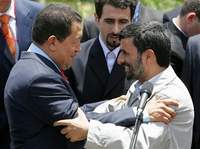Tehran eyes Latin America for its Anti-US bid
Iranian President Mahmoud Ahmadinejad visited Venezuela and said that Hugo Chavez was “the leader of the struggle against imperialism”.

As both countries work hard to develop a peaceful nuclear program harshly questioned by Washington, Iran and Venezuela moved forward political and economical integration this week after President Mahmoud Ahmadinejad visited his Venezuelan counterpart, Hugo Chavez in Caracas. The Iranian leader praised Chavez for his firm opposition to the United States on Sunday, promising to deepen an alliance that is helping Tehran fight U.S. moves to rein in its nuclear program.
President Mahmoud Ahmadinejad said the United States represents "the tyrants of the world today" and called Chavez "my brother" and "the champion, the leader of the struggle against imperialism." The two leaders met before travelling to New York for this week's U.N. General Assembly.
The visit comes as Caracas is fighting for a seat at the UN Security Council. Venezuela’s bid counts with the support of several Middle East nations, as Washington proposes the more friendly Guatemala in its place. Chavez said the U.S. government "is afraid of Venezuela's voice on the Security Council. They're afraid of our voice, our presence."
Venezuelan and Iranian officials signed a series of accords, including agreements for Tehran to help Venezuela develop oil fields. The governments plan to build factories to produce everything from bricks to bicycles, and have agreed to set up a $2 billion investment fund.
Ahamdinejad made his first visit to a South American nation in what could be seen as an Iranian bid to gain support in the region for its nuclear program. South America has seen the installation of several governments that trail non-aligned foreign policies and, as for Venezuela, Ecuador and Bolivia, have increasingly raised their voices to criticize the US role in today’s world.
However, Ahmadinejad’s bid could be blocked by the poor relations Iranian has developed with key South American countries in the past, as Argentina and Brazil. Argentina and Iran have broken off diplomatic ties since intelligence reports probed that Hezbollah was behind the bombing of the Israeli Embassy and a Jewish center in Buenos Aires in 1992 and 1994, respectively.
On the other hand, both Brazil and Argentina have important and very active Jewish communities that for obvious reasons are not sympathetic with the Iranian approach.
In Caracas, a leading Jewish group, the Venezuelan Confederation of Israeli Associations, expressed discomfort over the visit by a leader who has called for Israel's destruction. Freddy Pressner, president of the Venezuelan Confederation of Israeli Associations, expressed outrage over Ahmadinejad's visit. "We can't be pleased or satisfied with the presence of someone who has said publicly that one solution (to the Mideast conflict) is the destruction of the state of Israel."
The Venezuelan government says its critical stance against Israel and close ties with Iran are not linked to its relations with Jews, which it says remain open and positive.
Hernan Etchaleco
Pravda.ru
Subscribe to Pravda.Ru Telegram channel, Facebook, RSS!


